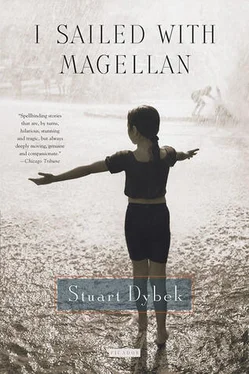Stuart Dybek - I Sailed with Magellan
Здесь есть возможность читать онлайн «Stuart Dybek - I Sailed with Magellan» весь текст электронной книги совершенно бесплатно (целиком полную версию без сокращений). В некоторых случаях можно слушать аудио, скачать через торрент в формате fb2 и присутствует краткое содержание. Год выпуска: 2004, Издательство: Farrar, Straus and Giroux, Жанр: Современная проза, на английском языке. Описание произведения, (предисловие) а так же отзывы посетителей доступны на портале библиотеки ЛибКат.
- Название:I Sailed with Magellan
- Автор:
- Издательство:Farrar, Straus and Giroux
- Жанр:
- Год:2004
- ISBN:нет данных
- Рейтинг книги:4 / 5. Голосов: 1
-
Избранное:Добавить в избранное
- Отзывы:
-
Ваша оценка:
- 80
- 1
- 2
- 3
- 4
- 5
I Sailed with Magellan: краткое содержание, описание и аннотация
Предлагаем к чтению аннотацию, описание, краткое содержание или предисловие (зависит от того, что написал сам автор книги «I Sailed with Magellan»). Если вы не нашли необходимую информацию о книге — напишите в комментариях, мы постараемся отыскать её.
story writer Stuart Dybek returns with eleven masterful and masterfully linked stories about Chicago's fabled and harrowing South Side. United, they comprise the story of Perry Katzek and his widening, endearing clan. Through these streets walk butchers, hitmen, mothers and factory workers, boys turned men and men turned to urban myth.
solidifies Dybek's standing as one of our finest chroniclers of urban America.
I Sailed with Magellan — читать онлайн бесплатно полную книгу (весь текст) целиком
Ниже представлен текст книги, разбитый по страницам. Система сохранения места последней прочитанной страницы, позволяет с удобством читать онлайн бесплатно книгу «I Sailed with Magellan», без необходимости каждый раз заново искать на чём Вы остановились. Поставьте закладку, и сможете в любой момент перейти на страницу, на которой закончили чтение.
Интервал:
Закладка:
In the years that followed, home was wherever he set that suitcase down — a sad succession of flophouses and transient hotels, dumps that seemed tenanted by fugitives from the collective unconscious: Depression Deco lobbies; ill-lit corridors lined with doors emitting smells like whispers and whispers like smells; restless, rheumatic rooms that creaked and groaned under their own dingy weight, rooms that came furnished with desperation, and wallpapered with worn, fitful dreams. He carried a sax case but was past his time for saxophones and their slinky, sultry, seductive ways; their nocturnal predilections and swanky pretensions were for breaking the hearts of younger men. On his deathbed, his father had gestured him closer and before dying whispered in his ear, “The wallflowers, son, go for the wallflowers. They’ll appreciate it.” But his father was wrong about that as he was about everything else. The wallflowers were a vain, angry, neurotic, and anything but appreciative lot. Sometimes, in a fog, down by the docks, he’d hear sounds echoing the warning that lights could not convey — buoys dinging their bells, the moody moans of foghorns — and he’d think about the glockenspiel, recalling the sensitive touch of her mallets, and the patterns her glittering vertebrae left along his skin. He’d feel the blue tattoo ache like a bruise from bite marks on his shoulder. He’d think about the tuba until he could feel again a ghostly impression of her hard, cool mouthpiece and taste the brass against his lips (a taste not unlike that of his own blood after a fistfight), and then he’d recall the way his breath flowed into her, as if there was no filling her up, as if she was sucking it from the deepest pocket of his body, leaving him hollow. He had carried that hollowness within him for years; he didn’t want to feel hollow any longer. Whatever came after the tuba would have to arrive on a breath of its own.
Now, he listens to the concertina wheeze, and perhaps to find a little respite from his worries, Lefty remembers nights as a child when his lungs sounded like wind blowing past a tattered shade, and his bronchial tubes gave recitals of the croup. While his father was God knows where, and his mother was at work, his grandmother would come to nurse him. It was a large family on his father’s side, and his grandmother managed to love them all and yet showed such special affection toward Lefty — maybe because his father was always God knows where — that everyone called her Lefty’s Gran, even if she was their grandmother, too.
Lefty’s Gran would show up whenever he was sick, carrying her green mesh shopping bag. She always carried that bag in case she suddenly had to do some shopping, or on the chance she stumbled upon something valuable lying in the street. Even if it served no other purpose, it was good for carrying her purse in. When she came to see Lefty, the shopping bag would also contain the chartreuse protrusions of a half dozen lemons and the blue-green bulge of an economy-size jar of Vicks VapoRub, against which other, lesser bottles clinked.
The sight of her would set Lefty coughing.
“So, Louis,” his gran would say — oddly Lefty’s Gran refused to call her grandson Lefty—“So, Louis, I hear you got the Krupa again.”
The lemons and Vicks were part of her cure for the Krupa. But before unloading the shopping bag, before doing anything else, Lefty’s Gran would fill the apartment with steam. She’d go from room to room, balancing pie pans and cookie trays on the tops of radiators, and as she set them up they’d bang like cymbals punctuating her stream of muttering: “Kid’s got the Krupa ( Bang! ) the Gene ( Bam! ) the drummer man ( Boom! ) Krupa ( Crash! ).
“Hey, Louis ( Wham! ), whatayou got?”
“The Gene Krupa.”
“You can say that again ( Blam! ).”
“The Gene Krupa.”
“Ha!” Lefty’s Gran would expel a laugh resounding like a cymbal clap, as if he’d just said something surprisingly hilarious even though she had taught him the you-can-say-that-again routine. “You can bet your dupa ( Bing! ) you got the Krupa ( Bong! ).”
She’d fill the pie pans and cookie trays to the brim with water; she’d set kettles and pots on every burner of the stove and let them boil; she’d turn the shower on hot in the bathroom and let it pour down clouds of steam; she’d hook the vaporizer up beside Lefty’s bed, fuel it with a glob of Vicks, and aim its snorky exhalations in his direction. The entire flat began to heave with breath.
While the steam rose like genies rushing out of bottles, Lefty’s Gran would rub camphor oil on his chest and on his neck, where his glands were swollen; she’d dab a streak of Vicks along his upper lip as if she was drawing a mustache. Then, she’d undo the babushka that she wore whether she was outside or in. She’d whisk it off with the flourish of a magician doing a trick, and years would disappear. When he saw her blurred in steam, minus her babushka, Lefty could imagine his grandmother as a girl. He wondered if she kept her head covered because her hair looked younger than she did. It was a lustrous ash blond, so springy with curls that it looked fake, as if she might be wearing a wig. This girlishness that she kept hidden was like a secret between them.
She’d twine her satiny babushka around his throat, and over the babushka she would wrap a rough woolen scarf that was reserved for these occasions and known as the croup scarf. The scarf, a clashing maroon-and-pea-green plaid anchored at one end by a big safety pin, retained past smells of camphor and Vicks. Its scratchy wool chapped his chin where his skin wasn’t protected by the babushka.
By then, the flat was expanding with steam. Mirrors disappeared in the mist they reflected. Through the mist, the wallpaper, a pattern of vines and flowers, opened into three dimensions and came alive like flora in a rain forest. The background noise of outside traffic transformed into screeches of monkeys and tropical birds. Steam smoldered along the insides of windows and made them sweat; it condensed on the ceiling into beads that hung like rain above Lefty’s bed. He was sweating, too, sweating out the fever; germs were fleeing his body through the portholes of his pores.
In the kitchen, lost in steam, Lefty’s Gran was squeezing lemons. He could hear the vigorous, musical rattle of her spoon as she stirred honey and a splash of boiling water into syrup, then added lemon juice, and last, but not least, a dash of whiskey — Jim Beam — which was the brand of choice for all his relatives, by tradition referred to simply as Beam. Beam as in a ray of light.
Even stuffed up, Lefty could smell its fiery perfume.
The apartment was filling with aromas: pie tins and cookie trays baking on top of merrily knocking radiators; menthol, eucalyptus, camphor, lemon; and through the steam, like a searchlight glancing through fog: Beam. Lefty’s Gran stirred the lemon and honey concoction together in a coffee mug but served it in jiggersize portions, although they referred to a jigger as a shot glass — another family tradition. It seemed an apt name, as far as Lefty was concerned, for a glass that had the shape, density, and sometimes the wallop of a slug.
He’d sip his medicinal drink until it was cool enough, then belt it down as if drinking a toast: Na zdrowie, germs, take this! When the shot glass was empty, his gran would bring a refill on the theory that he needed fluids. She’d have a couple belts herself on the theory that she needed fluids, too.
“ Na zdrowie, ” she’d say — bottoms up!
“ Na zdrowie ,” he’d answer — down the hatch!
On such white winter mornings — white steam on one side of the pane, white snow on the other — propped on a throne of pillows with the babushka like a raja’s turban wound around his swollen glands; with menthol, eucalyptus, camphor, lemon, and through the steam, his gran materializing with a mug in one hand and a bottle of Beam in the other — on white mornings like that, how could a boy not conclude that being sick might almost be worth the joy of getting well? Those were mornings to be tucked away at the heart of life, so that later, whenever one needed to draw upon a recollection of joy in order to get through troubled times, it would be there, an assurance that once one was happy and one could be happy again.
Читать дальшеИнтервал:
Закладка:
Похожие книги на «I Sailed with Magellan»
Представляем Вашему вниманию похожие книги на «I Sailed with Magellan» списком для выбора. Мы отобрали схожую по названию и смыслу литературу в надежде предоставить читателям больше вариантов отыскать новые, интересные, ещё непрочитанные произведения.
Обсуждение, отзывы о книге «I Sailed with Magellan» и просто собственные мнения читателей. Оставьте ваши комментарии, напишите, что Вы думаете о произведении, его смысле или главных героях. Укажите что конкретно понравилось, а что нет, и почему Вы так считаете.












